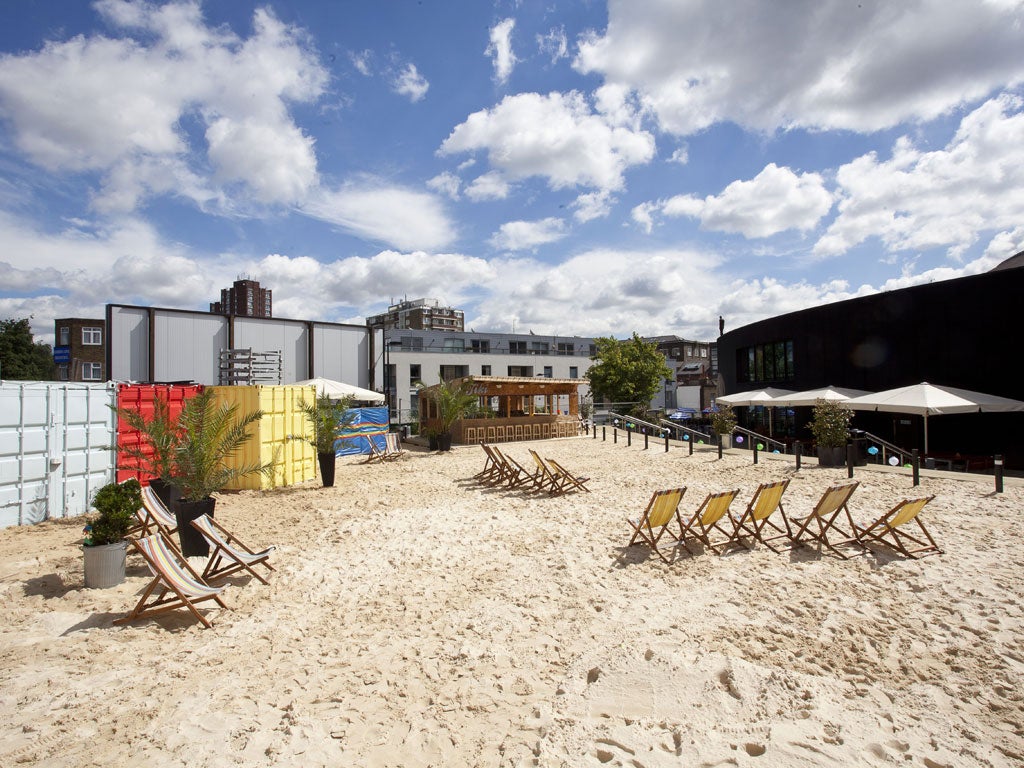City beaches: Britain's coastal explosion
You might not be able to see the sea, but a wave of temporary beaches inspired by hip European hangouts are bringing summer to our cities

Your support helps us to tell the story
From reproductive rights to climate change to Big Tech, The Independent is on the ground when the story is developing. Whether it's investigating the financials of Elon Musk's pro-Trump PAC or producing our latest documentary, 'The A Word', which shines a light on the American women fighting for reproductive rights, we know how important it is to parse out the facts from the messaging.
At such a critical moment in US history, we need reporters on the ground. Your donation allows us to keep sending journalists to speak to both sides of the story.
The Independent is trusted by Americans across the entire political spectrum. And unlike many other quality news outlets, we choose not to lock Americans out of our reporting and analysis with paywalls. We believe quality journalism should be available to everyone, paid for by those who can afford it.
Your support makes all the difference.Every August, Paris all but shuts down as city dwellers escape to the countryside or coast in search of fun and frolics. In 2002 the mayor, Bertrand Delanoë, came up with a way of entertaining residents stuck in the hot and humid capital: Paris-Plage, a temporary artificial beach along the Seine. It has since become an annual fixture, as well as being repeated in other locations around the city.
The idea spread to this side of the Channel, first appearing at east London's Truman Brewery in 2007 before popping up all over the city, most notably at the Southbank Centre, which introduced an ephemeral beach along Queen's Walk in 2011. This year it has Rainbow Park, a multi-coloured sand installation that is part of the Centre's Festival of the World. Last week, the Roundhouse arts venue in north London unveiled Camden Beach, transforming its outdoor terrace into a seaside destination filled with 150 tons of sand, deckchairs, palm trees, parasols and tiki huts.
But the most spectacular is to arrive next month. The Beach: London, situated on the Thames in Greenwich, will be the largest of its kind in Europe. While it might perhaps be a little optimistic for Mayor Boris Johnson to describe the man-made beach as having "golden shores to rival even the best of the Caribbean", it is expected to be a new star attraction.
"Visitors think they're fantastic, and they add a bit of fun to an already lively city," says David Leslie of Visit Britain. "People love the beach; it's good to get the sand between your toes and you don't get the smell of dead seaweed. There's no harm in having a bit of the countryside in the inner city."
The Beach: London was due to open next week in time for the Olympics, but according to Frank Dekker, one of its organisers, "construction complications" and "bureaucratic issues" have delayed it. "It's certainly been a consolation that it hasn't been beach weather because we would have all been devastated," says Dekker. "We hear it's going to be an Indian summer until the end of October anyway." A turn of meteorological events that everyone – including frustrated urban-beach planners – are praying for.
Of course, it's not just the capital that's perfecting seaside culture. Manchester, Liverpool and Birmingham have all introduced a taste of the Med by installing artificial beaches in the past, while on Tuesday, Lincoln will open its own compact urban beach in City Sqaure, complete with Punch and Judy show. In fact, travel to just about any major landlocked European city and you'll find them: Prague, Copenhagen, Amsterdam, Dublin. Berlin, which has around 30, was actually the first to come up with the concept, but Paris's success means they are usually credited with the craze of recent years.
Fortunately some overdue sunshine is expected next week; not that the rain seems to be dampening too many people's fun. "We've been really pleasantly surprised," says James Heaton, head of operations at the Roundhouse. "The sun came out last Sunday and it was packed but even when it's been off and on we've found the English to be remarkably resilient. They just duck inside for 10 minutes and let it rain and then get back out there. As long as there's a bit of sun creeping in every so often people seem happy enough."
Join our commenting forum
Join thought-provoking conversations, follow other Independent readers and see their replies
Comments